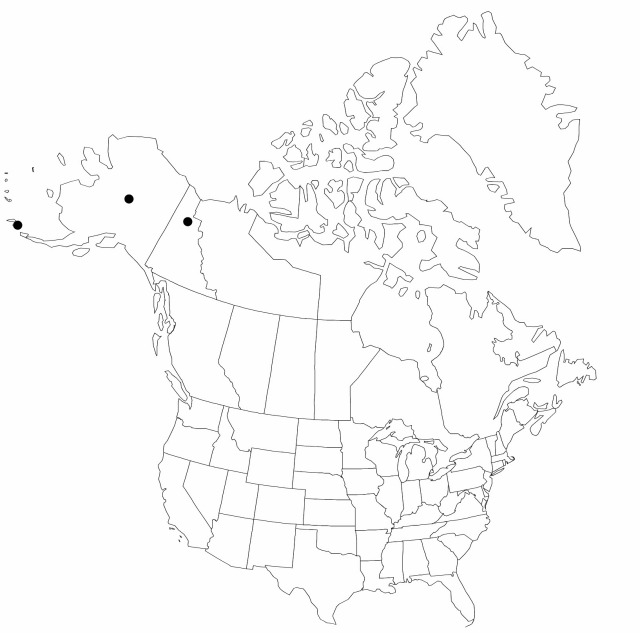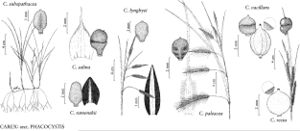Difference between revisions of "Carex ramenskii"
Repert. Spec. Nov. Regni Veg. 13: 164. 1914.
FNA>Volume Importer |
FNA>Volume Importer |
(No difference)
| |
Revision as of 19:09, 24 September 2019
Plants not cespitose. Culms obtusely or acutely angled, 10–50 cm, glabrous. Leaves: basal sheaths brown; sheaths of proximal leaves glabrous, fronts lacking spots and veins, apex U-shaped; blades usually amphistomic, 2–4 mm wide, papillose or smooth. Proximal bract equal to or longer than inflorescence, 1.5–3.5 mm wide. Spikes erect; staminate 1–2; pistillate 1–4; proximal pistillate spike 1.6–2.4 cm × 4–7 mm, base cuneate or attenuate. Pistillate scales dark purple-brown; 2–5.5 × 1.2–1.8 mm (including awn), narrower than perigynia, midvein reaching apex or not, 1/10–1/2 the width of scale, apex acute to acuminate, rarely aristate, awn glabrous or scabrous. Perigynia ascending, pale brown, obscurely veined or with a few prominent veins on each face, somewhat inflated, loosely enclosing achenes, ovoid to ellipsoid, 2.7–3.5 × 1.6–2.4 mm, leathery, dull, base rounded, apex acute, glabrous; beak widely conic and almost continuing body of perigynium, 0.1–0.2(–0.3) × 0.30–0.45 mm, entire. Achenes entire or strongly constricted on 1 face, or irregularly constricted on margins, apex truncate to retuse, dull; style base straight, sometimes bent. 2n = 80 (ne Russia).
Phenology: Fruiting Jun–Aug.
Habitat: Saline or brackish marshes, shores
Elevation: 0–10 m
Distribution

Yukon, Alaska, Asia.
Discussion
Carex ramenskii seems to be the northwestern counterpart of C. salina and is thought to be a stabilized hybrid between C. lyngbyei and C. subspathacea. It has not been recorded outside of the common range of the two supposed parents. Plants identified as C. ramenskii from Alaska and Northwest Territories attributed to C. ramenskii are mostly C. subspathacea. Carex ramenskii represents part of the northwestern reports of C. salina var. and subsp. cuspidata. Plants with awned pistillate scales (var. caudata) occur throughout the range of the species and are considered extremes of variation. Intermediate (or backcross) specimens with the supposed parental species, C. lyngbyei × C. ramenskii, are known as C. ×cryptochlaena T. Holm.
Selected References
None.
